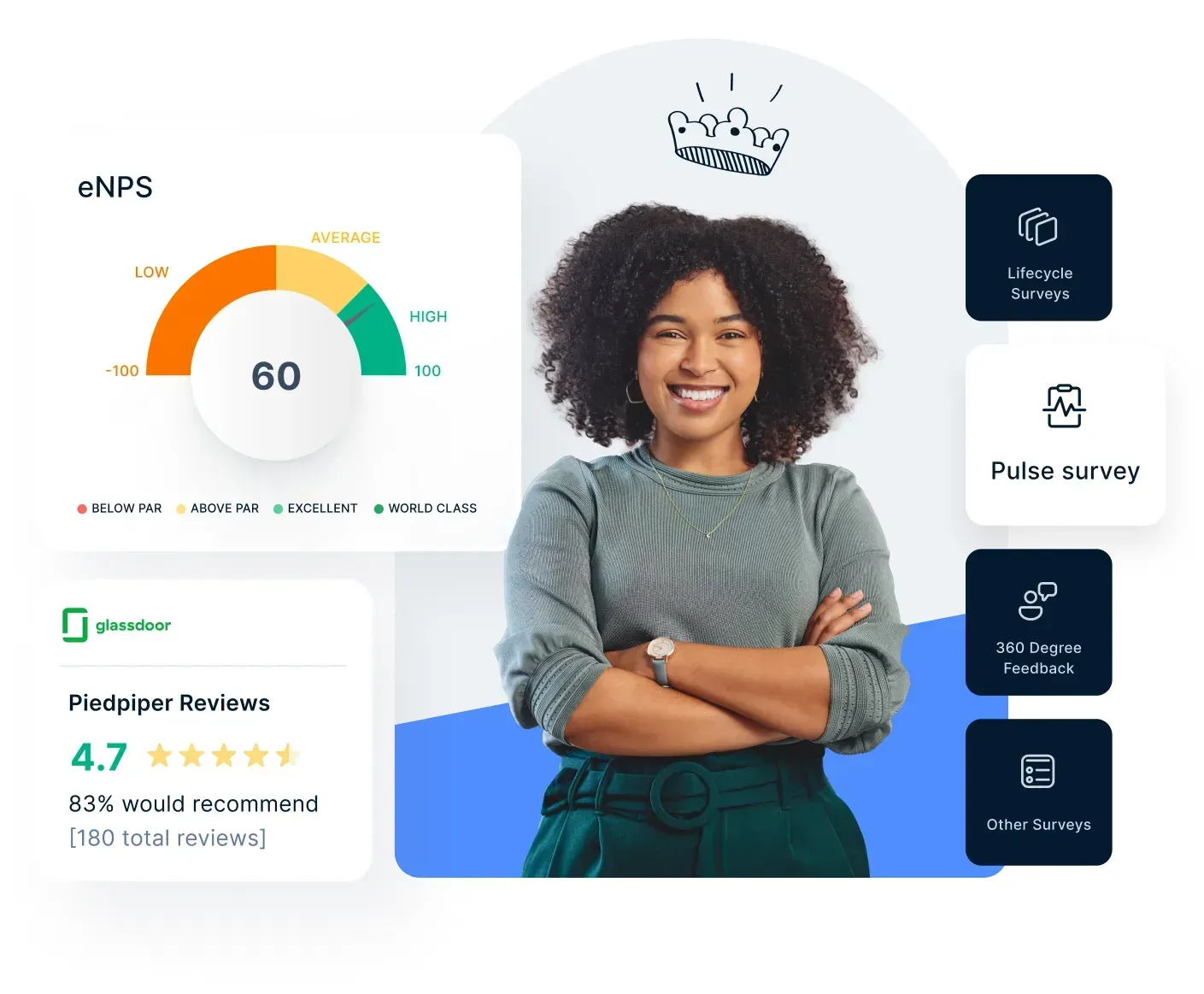30 Fragen zur Mitarbeiterbefragung, um das Engagement am Arbeitsplatz zu verbessern
A well-structured employee feedback survey helps organizations understand employee experience, engagement, and growth opportunities. This guide covers feedback questions to ask employees, including anonymous employee feedback questions and employee feedback questions for manager.
Auf dieser Seite
Creating a workplace where employees feel valued, heard, and supported is essential for long-term success. A positive work environment not only boosts morale but also enhances productivity and retention. However, understanding what employees truly need requires more than assumptions—it demands direct input from them.
This is where employee feedback questions become crucial. By regularly gathering feedback, businesses can identify areas for improvement, strengthen leadership effectiveness, and foster a culture of continuous growth. A well-structured survey helps uncover insights about engagement, job satisfaction, and overall workplace culture, making it a powerful tool for organizational success.
To help you get started, we have compiled 20 essential employee feedback survey questions covering key areas like work environment, management effectiveness, career growth, and job satisfaction. These feedback questions for employees will provide actionable insights that drive meaningful improvements, helping you build a more positive, productive, and engaged workforce.
Was ist eine Umfrage zum Mitarbeiterfeedback?
A tool utilised by business owners, executives, and HR specialists is an employee feedback survey. These questionnaires inquire about a employees career progress, work environment, and job happiness. The corporate culture, employee experience, and retention are then improved using the information.
Vorteile einer Umfrage zum Mitarbeiterfeedback
Frühzeitige und häufige Umfragen zum Mitarbeiterfeedback haben mehrere Vorteile. Im Folgenden werden einige Vorteile von Umfragen zum Mitarbeiterfeedback genannt:
- Steigerung der Zufriedenheit und des Engagements der Mitarbeiter
- Verbesserte Kontrolle der internen Kommunikation
- Verbessertes Verständnis für die beruflichen Bestrebungen der Arbeitnehmer
- die Fähigkeit, konstruktive Kritik für die berufliche Weiterentwicklung zu üben
- Identifizierung und Beseitigung von Hindernissen für Arbeitnehmer mit Beeinträchtigungen, neurodiversen Störungen oder anderen langfristigen Gesundheitsproblemen
- Messung der Zufriedenheit mit der Vergütung oder den angebotenen Vergünstigungen
- Verfolgung der Veränderungen in der Einstellung der Mitarbeiter
- Untersuchung früherer demografischer Muster, z. B. Geschlechtergleichheit, ethnische Vielfalt und Altersverteilung in Ihrem Unternehmen
20 Employee feedback questions for managers and employers to include in their surveys
You may get a sense of the daily working environment at your company from the employee feedback survey questions you ask. Although it's crucial to measure productivity, you shouldn't broach the subject of employee performance. Employee feedback surveys provide your team the chance to share good and bad news with you.
If used appropriately, this information may even show you how to boost your revenue. Team productivity is directly impacted by feelings of belonging, connection, and other aspects of workplace culture. Use the following survey questions for employee feedback as a starting point for your survey design:
Fragen zur Mitarbeiterbefragung über Erfahrungen
Understanding employee experience is key to improving job satisfaction and retention. These survey questions for employee feedback help assess workload, team dynamics, and overall job fulfillment. By including the best employee feedback questions, organizations can identify areas for growth and enhance the employee journey.
1. Fühlen Sie sich mit Ihren Mitarbeitern verbunden?
2. Fällt es Ihnen leicht, Ihrem Vorgesetzten Fragen zu stellen?
3. Würden Sie einen Freund oder Verwandten für eine offene Stelle in diesem Unternehmen vorschlagen?
4. Wie zufrieden sind Sie auf einer Skala von 1 bis 10 mit Ihrer Arbeit?
5. Glauben Sie, dass man der Führung Ihres Unternehmens vertrauen kann?
Fragen zur persönlichen Entwicklung in der Mitarbeiterbefragung
Growth opportunities play a crucial role in employee motivation and retention. These feedback questions to ask employees focus on career progression, skill development, and learning resources. By gathering insights, businesses can refine training programs and support employees in achieving their goals.
6. Besprechen Sie Ihre Karriere mit Ihrem Vorgesetzten? Wenn ja, wie häufig?
7. Glauben Sie, dass Ihr Team über klare Aufstiegs- und Entwicklungsmöglichkeiten verfügt?
8. Wissen Sie, an wen Sie sich bei der Arbeit wenden können, wenn Sie Unterstützung brauchen?
9. Haben Sie Zugang zu Ressourcen, um Ihre Karriere voranzutreiben?
10. Wurde Ihre Leistung in letzter Zeit bewertet?
Fragen zur Mitarbeiterbefragung über das Arbeitsumfeld
A positive work environment directly impacts productivity and morale. These questions to ask for employee feedback evaluate factors like workplace culture, collaboration, and physical workspace. Addressing these concerns helps organizations create a more engaging and inclusive atmosphere.
11. Arbeiten Sie in einer angenehmen Atmosphäre?
12. Glauben Sie, dass Sie über alle Werkzeuge und Ausrüstungen verfügen, die Sie zur Erledigung Ihrer täglichen Aufgaben benötigen?
13. Ist Ihr Arbeitsumfeld ablenkungsfrei und konzentrationsfördernd?
14. Haben Sie die Freiheit zu arbeiten, wann und wo es für Sie am produktivsten ist?
15. Fühlen Sie sich ermutigt, flexible Arbeitszeiten zu akzeptieren?
Employee feedback survey questions about engagement
Employee engagement drives performance and long-term commitment. These survey questions for employee feedback assess motivation levels, recognition, and alignment with company values. Insights from these surveys enable businesses to implement strategies that boost engagement and job satisfaction.
16. Haben Sie den Eindruck, dass Ihre engen Mitarbeiter stolz auf ihre Arbeit sind?
17. Scheinen sich die Ideale des Unternehmens in organisatorischen Veränderungen niederzuschlagen?
18. Freuen Sie sich jeden Tag darauf, zur Arbeit zu gehen?
19. Haben Sie sich innerhalb der letzten drei Monate bei einem anderen Unternehmen beworben oder an einem Vorstellungsgespräch teilgenommen?
20. Was wäre der Grund, wenn Sie dieses Unternehmen morgen verlassen würden?
Anonymous employee feedback questions
Encouraging honest input is easier with anonymous employee feedback questions. These questions help uncover workplace challenges, leadership concerns, and areas for improvement without fear of judgment. Anonymity fosters transparency, leading to more actionable feedback.
21. How valued do you feel at work?
22. Do you feel comfortable sharing your opinions and concerns with your manager? Why or why not?
23. What is one thing leadership could do to improve your overall work experience?
24. How often do you receive constructive feedback that helps you grow in your role?
25. On a scale of 1-10, how likely are you to recommend this company as a great place to work? Why?
Employee feedback questions about manager behavior
Managers play a critical role in employee success. These employee feedback questions for managers assess leadership effectiveness, communication, and support. Honest responses help managers refine their approach and create a more positive team dynamic.
26. How effectively does your manager communicate expectations and goals?
27. Does your manager provide constructive feedback that helps you improve?
28. How approachable is your manager when you have concerns or need support?
29. Does your manager recognize and appreciate your contributions?
30. What is one thing your manager could do to better support you in your role?

Get Your Free Employee Feedback Survey Template
Start collecting meaningful insights with our customizable survey template. Download now to enhance employee satisfaction and drive workplace improvements!
How to create an employee feedback survey
Creating an effective employee feedback survey requires careful planning and execution. A well-structured survey helps identify workplace strengths, uncover challenges, and guide meaningful improvements. Follow these steps to design a survey that delivers actionable insights:
1. Definieren Sie klare Ziele
Before crafting your employee feedback questions, determine what you want to achieve. Are you assessing employee engagement, leadership effectiveness, job satisfaction, or team collaboration? Clear objectives help ensure that your survey stays focused and relevant.
- Example goal: Measure employee satisfaction with remote work policies.
- Example goal: Understand the impact of recent leadership changes on team morale.
2. Craft the right questions
The success of your survey depends on the quality of your feedback questions for employees. Use a combination of:
- Likert scale questions: "On a scale of 1-5, how satisfied are you with the communication from leadership?"
- Multiple-choice questions: "Which factor most affects your job satisfaction? (a) Workload, (b) Management, (c) Career Growth, (d) Compensation"
- Open-ended questions: "What is one thing we can do to improve your work experience?"
Avoid vague or leading questions. Keep them short, clear, and easy to understand to encourage honest responses.
3. Use a reliable survey platform
A manual approach can lead to low response rates and difficulty analyzing results. Empuls offers an intuitive platform for creating surveys, distributing them efficiently, and analyzing responses in real time.
Key benefits of Empuls:
- Pre-built templates for various survey types (engagement, well-being, leadership effectiveness)
- AI-driven insights to identify workplace trends
- Automated reminders to improve response rates
- Anonymity features to encourage honest feedback
4. Ensure confidentiality and transparency
For employees to provide candid responses, they must feel safe. Keep surveys anonymous and communicate how feedback will be used. Share past survey results and highlight changes made based on feedback to build trust.
- Best practice: If using Empuls, enable anonymous mode to encourage honest participation.
5. Analyze and take action
Collecting feedback is just the beginning. Review survey results, identify recurring themes, and create an action plan.
- Segment responses: Break down results by department, tenure, or role for deeper insights.
- Prioritize key issues: Focus on patterns rather than isolated complaints.
- Close the feedback loop: Share insights with employees and outline specific steps for improvement.
For continuous improvement, surveys should be part of an ongoing feedback strategy rather than a one-time initiative. Platforms like Empuls streamline this process, making it easier to track trends and measure progress over time.
By following these steps, organizations can create meaningful employee feedback surveys that drive engagement, improve workplace culture, and enhance employee satisfaction.
Folgemaßnahmen nach einer Mitarbeiterbefragung
Nachdem Sie Ihre Mitarbeiterbefragung abgeschlossen und die Daten gesammelt haben, ist es an der Zeit, die Ergebnisse zu analysieren. Wenn Sie diese Art von Umfrage noch nie durchgeführt haben, kann es von Vorteil sein, sich mit einem Analysten oder Personalspezialisten in Verbindung zu setzen, der Sie bei der Auswertung der Ergebnisse unterstützen kann.
Denken Sie bei der Auswertung der Daten an Ihre Mitarbeiter, die die wichtigsten Interessengruppen sind. Teilen Sie ihnen mit, was Sie aufgrund ihrer Kommentare über die Kultur an Ihrem Arbeitsplatz herausgefunden haben. Danken Sie ihnen für ihre Teilnahme und für ihre Zeit. Ohne sie würde Ihr Team auf wertvollen Input und Möglichkeiten zur Weiterentwicklung verzichten. Dies könnte für Ihr Unternehmen zukünftigen Erfolg oder eine Tragödie bedeuten.
Setzen Sie sich ernsthaft für die Beseitigung von Problemen ein, auch wenn Sie noch nicht wissen, was Sie tun sollen. Scheuen Sie sich nicht, sich zu entschuldigen, wenn das Feedback eine Diskrepanz zwischen den Geschäftsidealen und den Erfahrungen der Mitarbeiter zeigt. Vergewissern Sie sich, dass Sie konkrete Folgemaßnahmen ergreifen (innerhalb eines Monats oder weniger). Der Umfang der Beteiligung an den nächsten Umfragen wird davon abhängen, wie Sie heute mit den Kommentaren umgehen.
Elevate your employee feedback surveys with Empuls

Gathering employee feedback is only effective when insights lead to meaningful action. Empuls streamlines this process with automated surveys, real-time analytics, and intuitive dashboards, helping organizations move beyond just collecting responses to driving engagement.
Why choose empuls for employee surveys?
✔ Comprehensive survey options – Conduct eNPS, pulse surveys, lifecycle surveys, and engagement surveys effortlessly.
✔ Real-time analytics & insights – Identify workplace trends and take data-driven action.
✔ Customizable & automated surveys – Tailor questions to suit your workforce and schedule automated feedback cycles.
✔ Seamless accessibility – Empower employees to share feedback via desktop or mobile, ensuring higher participation.
With Empuls, organizations can create a culture of continuous feedback, ensuring employees feel heard and valued while enabling leadership to make informed, strategic decisions.
Book a Demo to transform your employee feedback process today!
Die wichtigsten Erkenntnisse
Surveys of employee opinions are a great approach to learning how people feel about their workplaces. The data obtained can assist leaders in identifying the necessary adjustments. They aid in gauging employee satisfaction, well-being, and attitude toward their company. Your team may interact directly with leadership through a semi-annual or yearly survey, which fosters team trust.
Umfragen, bei denen die Mitarbeiter zu Wort kommen, sollten nicht nur einmal durchgeführt werden. Regelmäßige Mitarbeiterbefragungen ermöglichen es den Unternehmen, schneller auf Probleme zu reagieren, die in früheren Befragungen festgestellt wurden. Außerdem können sie so Trends im Laufe der Zeit beobachten. Teams aller Größenordnungen, vor allem aber die in größeren Unternehmen, wissen diese Daten sehr zu schätzen. Je schneller Sie expandieren, desto schwieriger kann es sein, die Unternehmenskultur zu erhalten.













